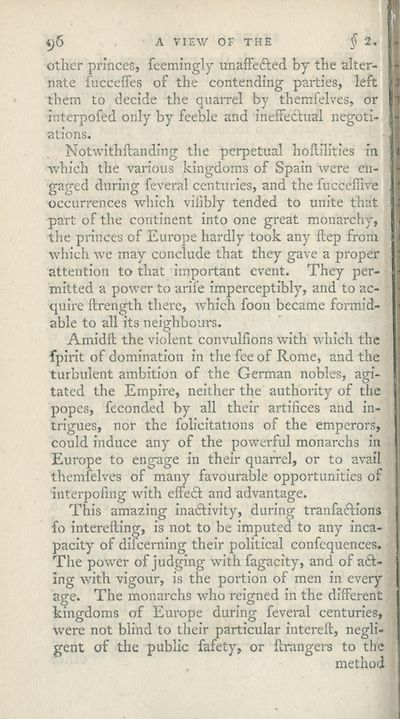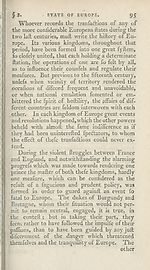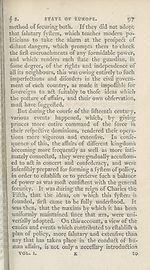Download files
Complete book:
Individual page:
Thumbnail gallery: Grid view | List view

y5 A VIEW OF THE $ 2.
other princes, feemingly unaffefted by the alter¬
nate fucceffes of the contending parties, left
them to decide the quarrel by themfelves, or
interpofed only by feeble and ineffectual negoti¬
ations.
Notwithftanding the perpetual hoflilities in
which the various kingdoms of Spain were en¬
gaged during feveral centuries, and the fucceffive
occurrences which viiibly tended to unite that
part of the continent into one great monarchy,
the princes of Europe hardly took any ftep from
which we may conclude that they gave a proper
attention to that important event. They per¬
mitted a power to arife imperceptibly, and to ac¬
quire ftrength there, which foon became formid¬
able to all its neighbours.
Amidft the violent convulfions with which the
fpirit of domination in the fee of Rome, and the
turbulent ambition of the German nobles, agi¬
tated the Empire, neither the authority of the
popes, feconded by all their artifices and in¬
trigues, nor the folicitations of the emperors,
could induce any of the powerful monarchs in
Europe to engage in their quarrel, or to avail
themfelves of many favourable opportunities of
interpofing with effedf and advantage.
This amazing inactivity, during tranfaefions
fo interefting, is not to be imputed to any inca¬
pacity of difeerning their political confcquences.
The power of judging with fagacity, and of adt-
ing with vigour, is the portion of men in every
age. The monarchs who reigned in the different
kingdoms of Europe during feveral centuries,
were not blind to their particular intereft, negli¬
gent of the public fafety, or ft rangers to the
method
other princes, feemingly unaffefted by the alter¬
nate fucceffes of the contending parties, left
them to decide the quarrel by themfelves, or
interpofed only by feeble and ineffectual negoti¬
ations.
Notwithftanding the perpetual hoflilities in
which the various kingdoms of Spain were en¬
gaged during feveral centuries, and the fucceffive
occurrences which viiibly tended to unite that
part of the continent into one great monarchy,
the princes of Europe hardly took any ftep from
which we may conclude that they gave a proper
attention to that important event. They per¬
mitted a power to arife imperceptibly, and to ac¬
quire ftrength there, which foon became formid¬
able to all its neighbours.
Amidft the violent convulfions with which the
fpirit of domination in the fee of Rome, and the
turbulent ambition of the German nobles, agi¬
tated the Empire, neither the authority of the
popes, feconded by all their artifices and in¬
trigues, nor the folicitations of the emperors,
could induce any of the powerful monarchs in
Europe to engage in their quarrel, or to avail
themfelves of many favourable opportunities of
interpofing with effedf and advantage.
This amazing inactivity, during tranfaefions
fo interefting, is not to be imputed to any inca¬
pacity of difeerning their political confcquences.
The power of judging with fagacity, and of adt-
ing with vigour, is the portion of men in every
age. The monarchs who reigned in the different
kingdoms of Europe during feveral centuries,
were not blind to their particular intereft, negli¬
gent of the public fafety, or ft rangers to the
method
Set display mode to:
![]() Universal Viewer |
Universal Viewer | ![]() Mirador |
Large image | Transcription
Mirador |
Large image | Transcription
| Antiquarian books of Scotland > Kings & rulers > History of the reign of the Emperor Charles V. > Volume 1 > (114) |
|---|
| Permanent URL | https://digital.nls.uk/109183699 |
|---|
| Description | By William Robertson. London : Cadell and Davies, 1798. |
|---|---|
| Shelfmark | ABS.1.76.13 |
| Additional NLS resources: | |
| Description | Thousands of printed books from the Antiquarian Books of Scotland collection which dates from 1641 to the 1980s. The collection consists of 14,800 books which were published in Scotland or have a Scottish connection, e.g. through the author, printer or owner. Subjects covered include sport, education, diseases, adventure, occupations, Jacobites, politics and religion. Among the 29 languages represented are English, Gaelic, Italian, French, Russian and Swedish. |
|---|

